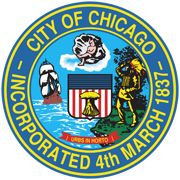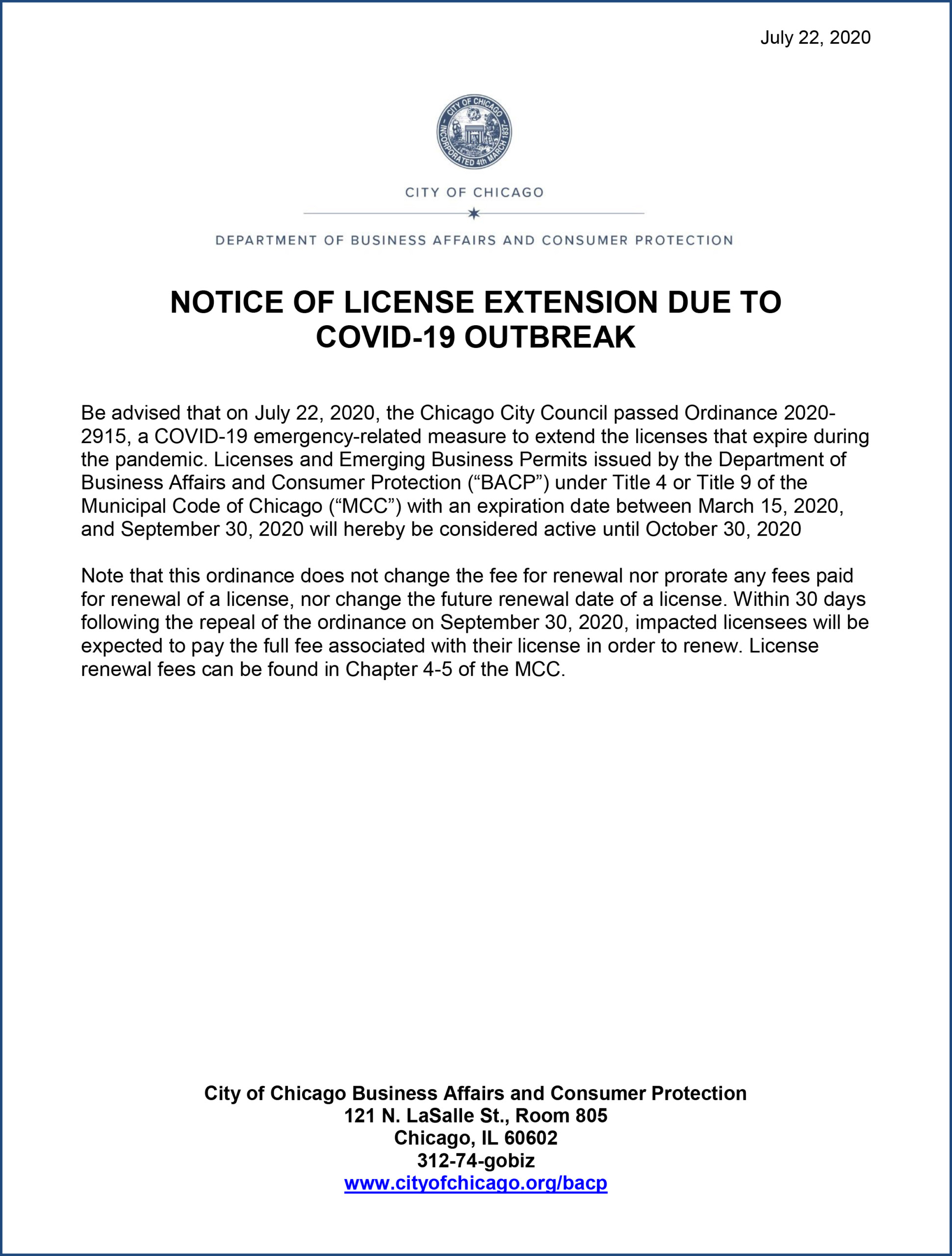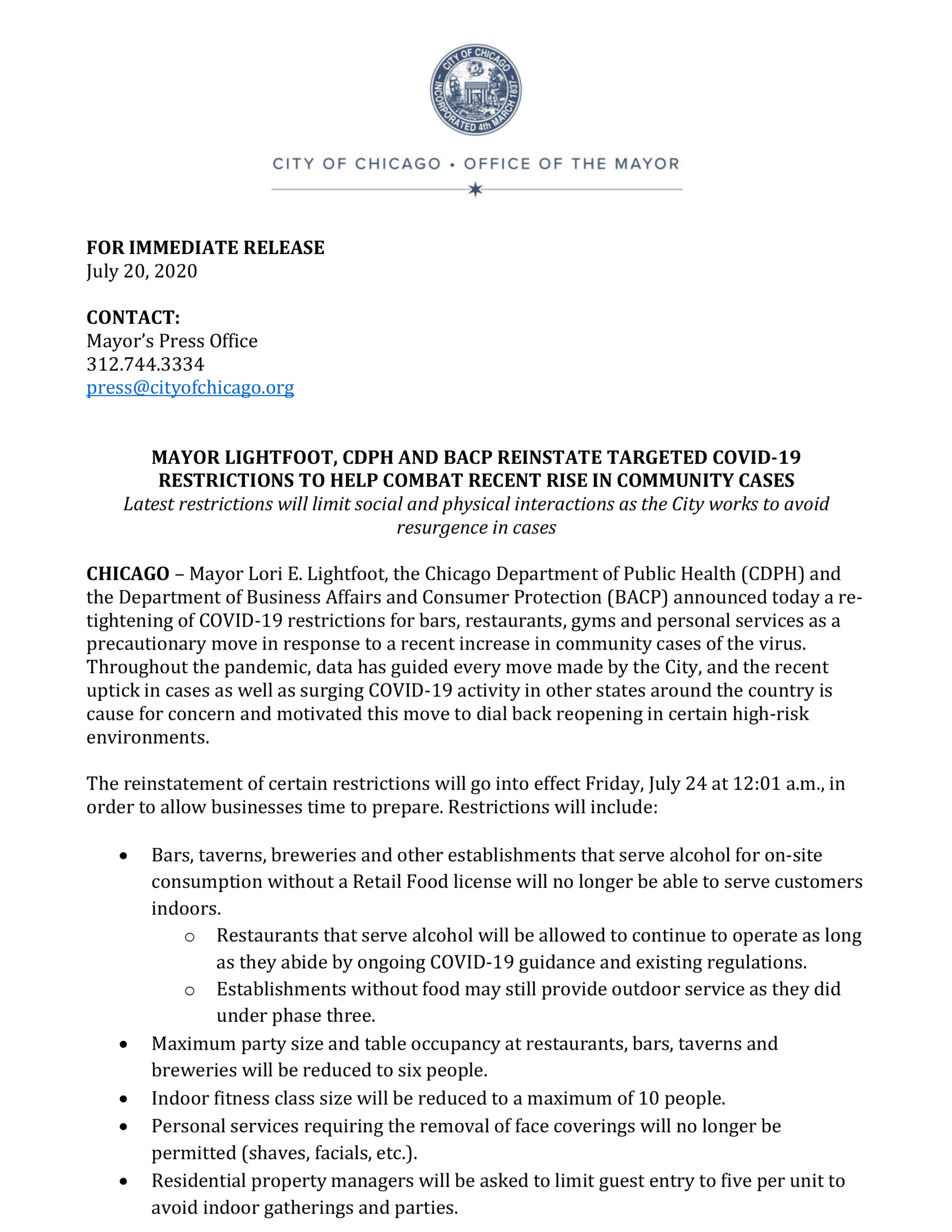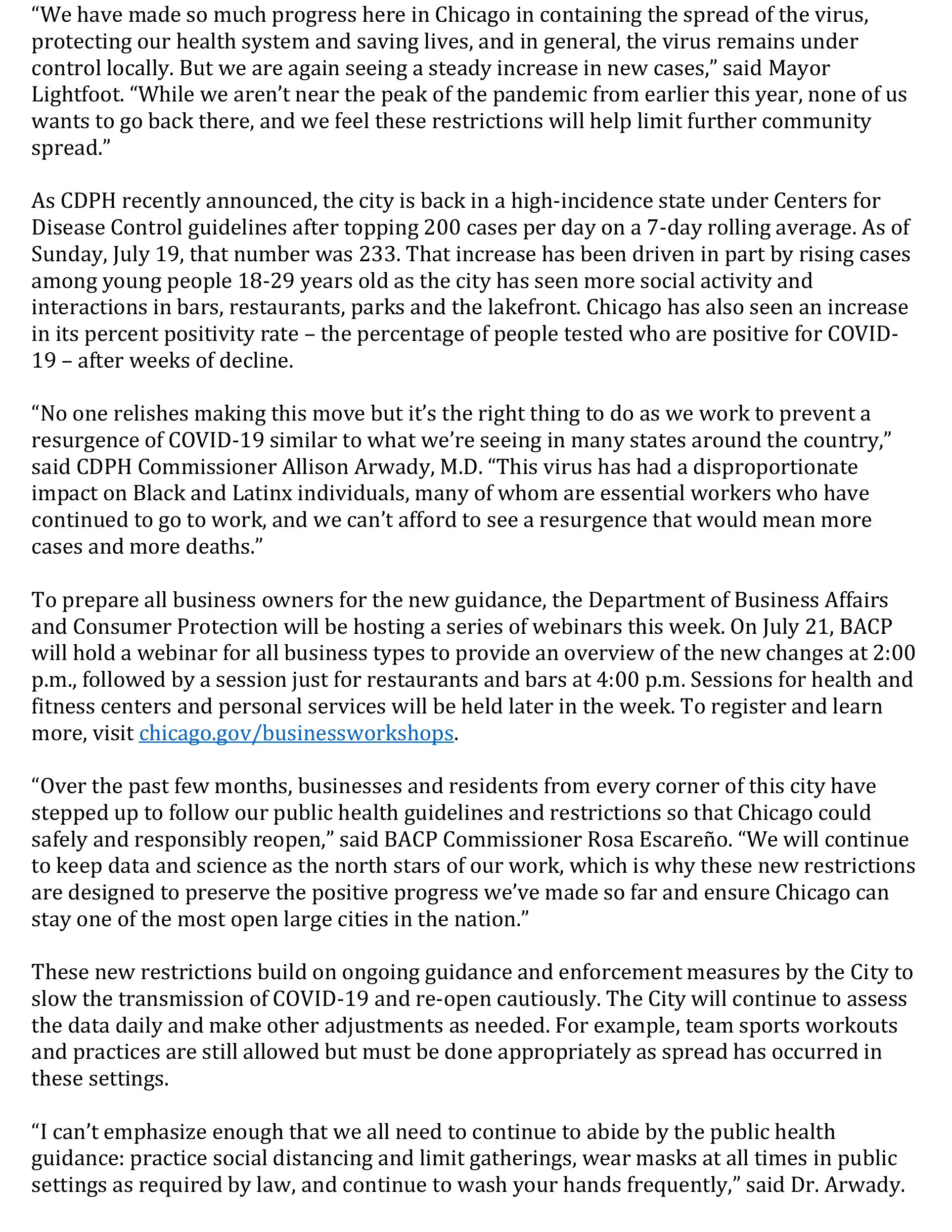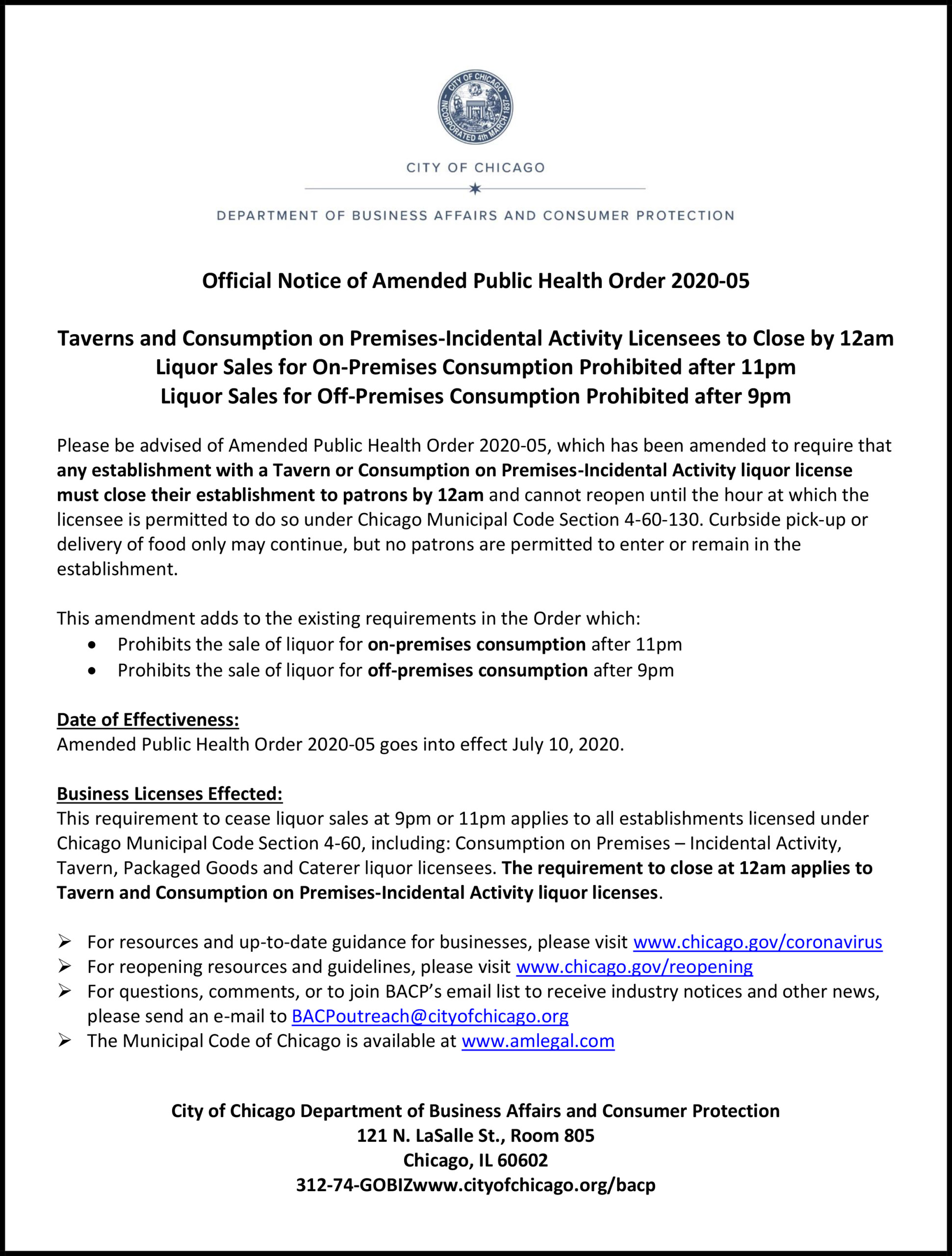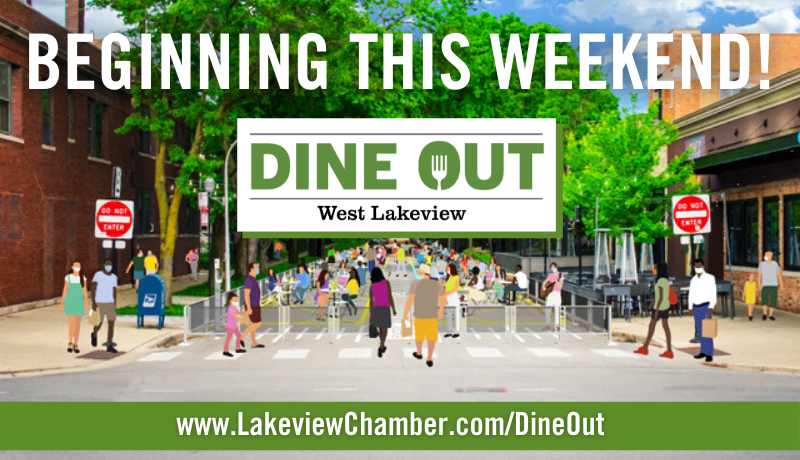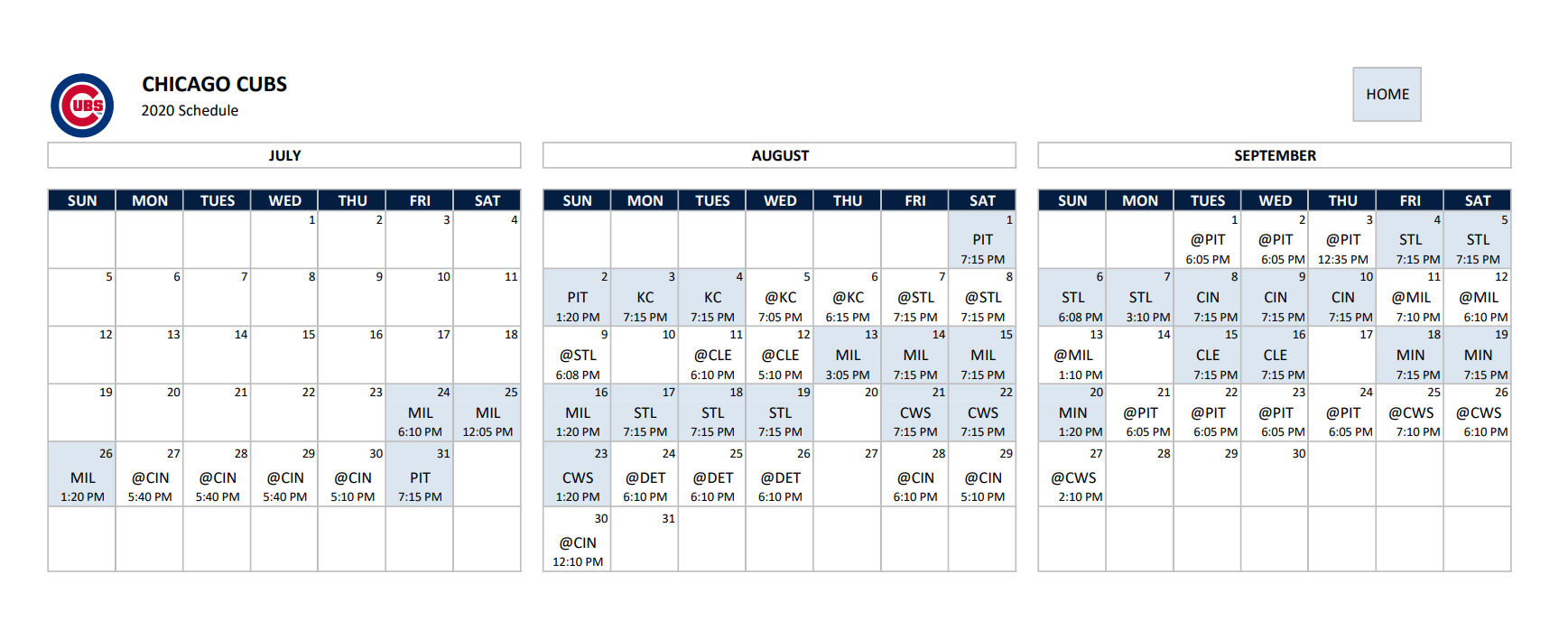Articles under Coronavirus Updates
Relief available to residential and business customers struggling due to COVID-19 pandemic
Peoples Gas is providing additional benefits to assist customers facing economic hardship due to the COVID-19 pandemic. The Illinois Commerce Commission, Illinois utilities and consumer advocates announced an agreement creating these benefits on June 19. The following benefits are available as part of the agreement.
Residential customers
Reconnection of customers disconnected prior to COVID-19 emergency
Residential customers whose natural gas service was disconnected in 2019 and reside at the same premises, will have the option to have their service restored if they contact us at 866-556-6001 by Aug. 25, 2020. Reconnection fees for these customers are waived until Dec. 31, 2020.
New Bill Payment Assistance Program
Peoples Gas has committed $12 million in additional assistance for customers. Beginning July 6, 2020, residential heating customers with an arrearage on their Peoples Gas account who have received a Low Income Home Energy Assistance Program (LIHEAP) or Share the Warmth grant since October 2019 will receive a Bill Payment Assistance Program (BPAP) grant toward their natural gas bill. A credit up to the amount of the customer’s arrearage, or $500 — whichever is less — will automatically be applied to the customer’s account.
Eligible customers who have not yet applied for a LIHEAP or Share the Warmth grant are urged to do so, as they may also receive a BPAP grant. Additionally, a customer whose account remains in arrears after all credits have been applied should contact us at 866-556-6001 to set up a payment arrangement.
Extended deferred payment arrangements
Residential customers who have fallen behind on their bills are eligible for an 18-month payment plan. Customers receiving Low Income Home Energy Assistance Program (LIHEAP) support or expressing hardship are eligible for a 24-month payment plan. These more flexible deferred payment arrangements are available until Dec. 31, 2020.
Learn whether you qualify for LIHEAP.
Residential customers’ down payments for the more flexible plans are capped at 10% of the deferred payment amount until Dec. 31, 2020.
LIHEAP-eligible customers and customers indicating hardship will not need to make down payments to enter into a flexible deferred payment plan until Dec. 31, 2020.
Customers who default on a flexible plan or whose financial condition changes may receive a one-time revised deferred payment plan with similar terms if they contact Peoples Gas before Aug. 1, 2021.
Commercial and industrial sales service customers may enroll in or renegotiate deferred payment plans until Aug. 31, 2020. Peoples Gas will offer a six-month deferred payment arrangement with a 30% down payment.
Suspension of new deposit assessment
Peoples Gas will not assess new deposits to new and existing residential customers until Aug. 25, 2020. For customers eligible for LIHEAP or indicating financial hardship, no new deposits will be assessed until Dec. 31, 2020.
Mayor Lightfoot, CDPH and BACP Reinstate Targeted COVID-19 Restrictions to Help Combat Recent Rise in Community Cases
Chicago Public Schools (CPS) Plan to Return in Fall on Hybrid Model
- Students from kindergarten through tenth grade will learn under a hybrid model where they are in classrooms a couple of days and remote learning other days
- High school juniors and seniors will solely use remote learning, which helps free up space in the schools
- Preschoolers and those with special needs will be in class full-time
- Students will be put in groups of 15, stay in same classroom all day with desks six feet away
- Each “pod” will have designated bathrooms and designated bathroom times to wash hands
- Entry into school and leaving school will be staggered
- There will be daily temperature checks, universal masking, and routine cleaning with the help of 400 new janitors
- Families with students of all ages will be allowed to opt out of in-person schooling for any reason
- City officials are asking parents to set the example for returning to school such as emphasizing the importance of social distancing, masks, and hand washing at home
Survey: Families, students and staff should submit feedback by July 31, 2020. A link to the survey can be found here: cps.edu/reopening2020survey
Virtual Feedback Meetings: The district will hold five meetings (three in English, two in Spanish) on the following dates. Participants must register in advance to participate.
Date: Monday, July 27, 2020
Time: 9:00 a.m. – 10:30 a.m.
Language: English
Registration Link: https://cpsreopeningconversation1.eventbrite.com
Date: Tuesday, July 28, 2020
Time: 4:00 p.m. – 5:30 p.m.
Language: Spanish
Registration Link: https://cpsreopeningconversation2.eventbrite.com
Date: Wednesday, July 29, 2020
Time: 9:00 a.m. – 10:30 a.m.
Language: Spanish
Registration Link: https://cpsreopeningconversation3.eventbrite.com
Date: Thursday, July 30, 2020,
Time: 4:00 p.m. – 5:30 p.m.
Language: English
Registration Link: https://cpsreopeningconversation4.eventbrite.com
Date: Friday, July 31, 2020
Time: 9:00 a.m. – 10:30 a.m.
Language: English
Registration Link: https://cpsreopeningconversation5.eventbrite.com
Taverns and Consumption on Premises-Incidental Activity Licensees to Close by 12:00 a.m.
As City Enters Phase Four of Reopening Framework, Ticketing Enforcement Ramps Up to Normal Operations
Beginning this month, the City will ramp up normal enforcement of certain vehicle violations that were temporarily suspended due to the COVID-19 outbreak. Ticket enforcement will resume citywide for street sweeping on July 1, while booting will commence in early July, City sticker and Residential Parking Permit violations will be enforced mid-month and expired vehicle registration enforcement will begin in October.
Since March 18, when the City began sheltering in place in response to the coronavirus pandemic, the Lightfoot Administration temporarily suspended debt collection, non-safety vehicle impoundments and the issuance of compliance tickets to provide relief to residents experiencing increased financial pressure from the COVID-19 global pandemic. During the early stages of the reopening plan, the Department of Finance began notifying motorists about their outstanding debt and offering to restructure or restart their payment plans to avoid default. Now that the City has entered phase four of the reopening framework, debt collection and payment plan defaults will also resume.
The City encourages anyone who may need assistance with outstanding debt to visit New Start Chicago at www.Chicago.gov/newstartchicago where residents can sign up for flexible payment plans for tickets and utility bills with a lower down payment and up to 60 months to repay amounts due. Residents can learn more or make payments online at www.Chicago.gov/finance.
Ticketing enforcement dates to remember:
| Enforcement Date | Violation Type |
|
July 1 |
Street Sweeping |
| July 6 | Booting |
| July 16 | Expired City Sticker & Residential Parking Permit |
| October 2 | Expired Vehicle Registration* |
Special Enrollment Periods for people who may have lost their employer-sponsored health care coverage
As Illinois continues to experience job losses as a result of the pandemic, the Illinois Department of Insurance and Get Covered Illinois are sharing vital information for those who have lost their job-based health insurance about an available option to purchase health care coverage under the Affordable Care Act (ACA).
The Affordable Care Act Health Insurance Marketplace provides a Special Enrollment Period (SEP) for anyone who loses their employer-based health insurance coverage due to job loss. Job loss is considered a “Qualifying Life Event” which allows for special enrollment. Some people may even qualify for subsidies, such as tax credits, that can help reduce premiums and other expenses.
The following website – https://getcovered.illinois.gov/en/Pages/SpecialEnrollmentPeriods.aspx – provides consumer fact sheets, FAQs, and contact information in multiple languages describing the various health insurance options and how to enroll. There are also public service announcement PDFs in multiple languages that can be downloaded and posted or shared.
While Special Enrollment Periods make it possible to enroll at any time for those who qualify, the traditional open enrollment period for 2021 health insurance plans on the ACA Marketplace begins November 1, 2020 and ends December 15, 2020. For more information about any of these options, please visit the website or call Get Covered Illinois at (800)318-2596.
Please share this link on your own website and with your social networks.
Dine Out West Lakeview
Cubs 2020 Schedule
The Cubs will open their 60-game season Friday, July 24, at 6:10 p.m. CDT against the Milwaukee Brewers at Wrigley Field.
QUARANTINE RESTRICTIONS ON PERSONS ENTERING CHICAGO FROM HIGH INCIDENCE STATES
ORDER OF THE COMMISSIONER OF HEALTH OF THE CITY OF CHICAGO
No. 2020-10
(QUARANTINE RESTRICTIONS ON PERSONS ENTERING CHICAGO FROM HIGH
INCIDENCE STATES)
Issued: July 2, 2020
WHEREAS, The City of Chicago, like other cities around the world, has been severely affected by COVID-19, with approximately 50,986 confirmed cases in the City as of June 24, 2020; and
WHEREAS, Through implementing rigorous and sensible public health measures, the City of Chicago has successfully slowed the transmission of COVID-19; and
WHEREAS, Mayor Lori E. Lightfoot has undertaken a cautious, incremental and evidencebased approach to reopening the City of Chicago; and
WHEREAS, Certain other cities and states are experiencing a significantly increased prevalence of COVID-19; and
WHEREAS, It is necessary and appropriate to put in place measures to reduce the spread of COVID-19 in Chicago as a result of people entering Chicago from high incidence states; and
WHEREAS, The Municipal Code of Chicago (“Code”) authorizes the Commissioner of Health of the City of Chicago (“Commissioner”) to implement emergency measures to stop the spread of communicable diseases, and to protect the health, safety, and welfare of the City’s residents, including but not limited to authority granted in Sections 2-112-080, 2-112-160(a)(4), and 2-112- 170 of the Code, in addition to 77 Ill.
Adm. Code Sections 690.1310 and 690.1330; now, therefore, The Commissioner of Health of the City of Chicago hereby orders as follows:
SECTION 1. All persons entering the City of Chicago from a state with a COVID-19 new case rate greater than 15 COVID-19 cases per 100,000 resident population per day, over a 7- day rolling average (“High Incidence State”) shall be subject to mandatory self-quarantine for 14 days or the duration of the person’s presence in Chicago, whichever is shorter, unless exempted in a protocol issued pursuant to Section 2 of this Order.
SECTION 2. The Commissioner shall issue protocols governing application of this Order. Such protocols shall include an exception to the self-quarantine requirement of this Order for “essential workers,” as defined in the protocols. The protocols may include other exceptions to self-quarantine that in the sole judgment of the Commissioner are necessary or appropriate to cover situations when self-quarantine is not possible, practicable or advisable, provided such exceptions continue to safeguard the public health. Such protocols may also contain guidance for businesses to implement rules governing their employees’ business and personal travel.
SECTION 3. The Chicago Department of Public Health shall make public the High Incidence States on its website.
SECTION 4. The Commissioner may take immediate action to protect the public from COVID-19 when a person enters the City of Chicago from a High Incidence State or jurisdiction, including, pursuant to City of Chicago Isolation and Quarantine Rules and 77 Ill. Adm. Code 690.1330, issuing a written or verbal order of quarantine to the person or group of persons.
SECTION 5. It shall be the duty of every person subject to this Order to comply with this Order. Any person who violates this Order shall be subject to applicable penalties provided by law.
SECTION 6. This Order shall take effect at 12:01 a.m. on July 6, 2020 and shall remain in effect until the Commissioner makes a written determination that the threat to public health posed by COVID-19 has diminished to the point that this Order can be safely repealed.
SECTION 7. If any provision of this Order or its application to any person or circumstance is held invalid by any court of competent jurisdiction, this invalidity does not affect any other provision or application of this Order, which can be given effect without the invalid provision or application. To achieve this purpose, the provisions of this Order are declared to be severable. This Order is meant to be read consistently with any Court order regarding this Order.
Section 3 of Order No. 2020-10 authorizes the Commissioner of Health to issue protocols governing implementation of this Order. These protocols, as may be amended from time to time, are set forth below in FAQ format for convenience.
Frequently Asked Questions
Q: Why is this order being issued and what does it mean?
A: In response to increased and high rates of COVID-19 transmission in certain states within the
United States, and to add to Chicago’s efforts to contain the spread of COVID-19, the City is
issuing an order applicable to anyone coming into the City from designated states that have a
significant degree of community-wide spread of COVID-19. This includes both Chicago
residents returning from travel to a designated state, and travelers arriving in Chicago from a
designated state. Anyone traveling from a designated state is directed to self-quarantine for a
14-day period or the duration of their time in Chicago, whichever is shorter, from the time of last
contact within the designated state, subject to the limited exceptions set out below.
Q: When does the Order go into effect?
A: This Order goes into effect on Monday July 6, 2020, at 12:01AM.
Q: Where does the Order apply?
A: The Order applies to individuals arriving in the City of Chicago, while they are in the city. The
city limits are defined in this interactive map.
Q: How will states be designated under the Order?
A: A state will be designated if it has a case rate greater than 15 new COVID-19 cases per
100,000 resident population, per day, over a 7-day rolling average.
Q: What states are currently covered by the Order?
A: A list of the states currently covered by the Order can be found here.
Q: Will the list change? When will it change?
A: The list of states will be reviewed and amended every Tuesday, starting July 14, 2020.
Q: What if I am traveling internationally?
A: Travelers coming from international locations are not covered by this Order and should follow
Centers for Disease Control and Prevention guidelines.
Q: How long is the Order in effect?
A: The Order will be in effect until further notice, and any changes will be based on applicable
public health guidance.
Q: What happens if I violate the Order?
A: Individuals found in violation of the Order are subject to fines of $100 – $500 per day, up to
$7,000.
Q: What if I arrived in Chicago before the effective date of the Order, do I still have to
quarantine?
A: The Order impacts individuals who arrive in Chicago on or after the effective date of July 6,
2020. If you arrive in Chicago prior to that date, the Order does not impact you. However, all
individuals are expected to follow the latest public health guidance for Chicago.
Q: What if I had a connecting flight through one of the designated states but did not stay
there?
A: The Order does not apply to any individual passing through designated states for less than
24 hours in the course of travel.
Q: What if I drove through one of the designated states but did not stay there?
A: The Order does not apply to any individual passing through designated states for less than
24 hours in the course of travel.
Q: What if I was in a designated state and then traveled to a non-designated state before
arriving in Chicago? Do I still need to quarantine?
A: Yes, if you spent longer than 24 hours in a designated state, you must quarantine for 14 days
from the time of last contact within the designated state, even if you spent time in a nondesignated state for a period after being in the designated state and before arriving in Chicago.
Q: What if I have to travel for my job?
A: Travelers coming to Chicago for non-essential business and residents returning to Chicago
from a designated state must adhere to the quarantine guidelines, subject to the limited
exceptions set out below.
Q: I already had my flight booked/trip planned, do I still have to follow the quarantine
Order?
A: Yes, all travelers arriving from designated states on or after the effective date of July 6, 2020,
are required to follow the quarantine Order, subject to the limited exceptions set out below.
Q: What if I came from one of the designated states and am staying less than 14 days?
A: The mandatory self-quarantine is for a period of 14 days or the duration of the individual’s
presence in Chicago, whichever is shorter.
Q: What does it mean to quarantine?
A: Quarantine helps prevent the spread of disease before a person knows they are sick,
including if a traveler has been infected with the virus but does not have symptoms. Under this
Order, quarantine means staying at a single designated home or dwelling for 14 days before
doing any activities outside of the home or dwelling. People in quarantine should separate
themselves from others as much as possible and check themselves for symptoms. Additional
requirements under quarantine include:
- The individual must not be in public or otherwise leave the dwelling that they have
identified as suitable for their quarantine, unless seeking medical care or COVID-19
testing. - If seeking medical care or testing, or when traveling to or from the airport, train station,
or bus station (if applicable), a face covering must be worn and public transportation
must not be used. - Food and other needed supplies must be delivered to the individual’s dwelling; the
individual may not leave the premises to acquire supplies. - The traveling individual or family group should be situated in separate quarters with a
separate bedroom and, if possible, separate bathroom facility from non-traveling
household members. - The individual must self-monitor for symptoms potentially consistent with COVID-19. If
any symptoms develop, the individual may leave the dwelling to receive testing for
COVID-19 but then must return to complete the 14-day quarantine while isolating from
other household members, regardless of the test result. A face covering must be worn
while seeking testing.
Q: I don’t have any symptoms – do I still have to quarantine?
A: Yes, all travelers from the designated states must quarantine for the full 14 days, subject to
the limited exceptions set out below. Individuals can develop symptoms and become contagious
up to 14 days from their last exposure.
Q: What if I get tested and am negative – do I still have to quarantine?
A: Yes, even individuals with a negative test result must quarantine for the full 14 days if coming
from a designated state. Individuals can develop symptoms and become contagious up to 14
days from their last exposure.
Q: My family/friends are coming from one of the designated states and are staying with
me – do I have to quarantine too?
A: No. Traveling individuals are encouraged to self-quarantine in the home they are traveling to
in Chicago and should avoid close interactions with non-traveling household members until the
14 days have passed. Other household members who did not travel from a designated state are
not required to self-quarantine.
Q: I’m returning from one of the designated states – can I go to work or is that a violation
of the Order?
A: All travelers returning to Chicago from the designated states must self-quarantine for 14
days, subject to the limited exceptions set out below.
Q: Are there any exceptions to the Order?
A. For purposes of the Order and this FAQ, “essential workers” are not subject to the mandatory
self-quarantine under the circumstances described in (a) and (b) below. An “essential worker” is
a person who works in critical infrastructure as designated by the Cybersecurity and
Infrastructure Security Agency (“primary work”) and:
(a) if a non-resident of Chicago, is traveling from a designated state to Chicago for the
primary purpose of carrying out primary work in Chicago, and who needs to be physically
present in Chicago in order to carry out that primary work, certified in writing by the worker’s
employer and made available for review by authorized officials from the Chicago Department of
Public Health and Chicago Police Department, or
(b) if a resident of Chicago, is returning from a designated state, and was in the
designated state for the primary purpose of carrying out primary work in that state, and who
needed to be physically present in that state in order to carry out that primary work, certified in
writing by the worker’s employer and made available for review by authorized officials from the
Chicago Department of Public Health and Chicago Police Department.
“Essential worker” includes any state, local, and federal officials and employees traveling in their
official capacities on government business, including military service.
Essential workers traveling for work purposes are subject to the following requirements:
- Essential workers should avoid any non-essential interactions until the quarantine period
has ended. They must limit their activities to work-related activities and functions that
directly support their work-related activities, and avoid public spaces as much as
possible. - Essential workers should monitor temperature and signs of symptoms, wear a face
covering when in public, maintain social distance, and clean and disinfect workspaces. - Essential workers are required, to the extent possible, to avoid extended periods in
public, contact with strangers, and large congregate settings.
Exceptions to the Order for personal travel will be permitted for travel for medical care and
parental shared custody. The Commissioner of Health may additionally grant an exemption
based upon an organization’s or business’ testing and other control policies or in extraordinary
circumstances, which warrant an exception from mandatory quarantine, subject to the terms
and conditions applied to essential workers or terms and conditions otherwise imposed by the
Commissioner in the interest of public health.
Q: How will this information be updated? How will travelers be notified?
A: The Order and its effects will be communicated through messaging on highways, at airports,
on the City’s website, and through social media. Hotels and short-term rentals will be asked to
communicate the 14-day quarantine to guests who have traveled from one of the designated
states.
